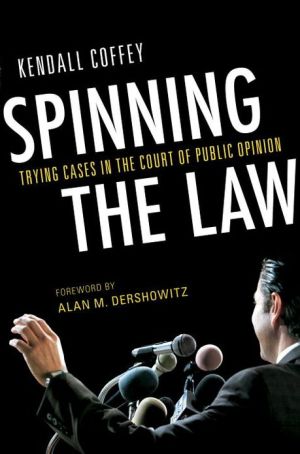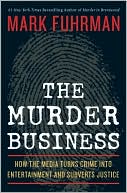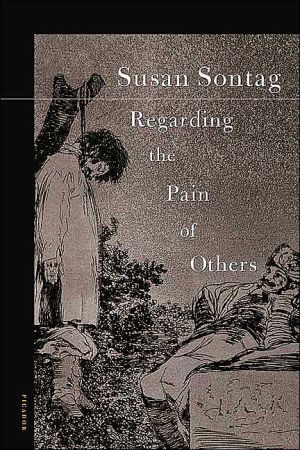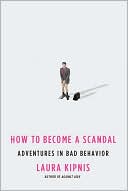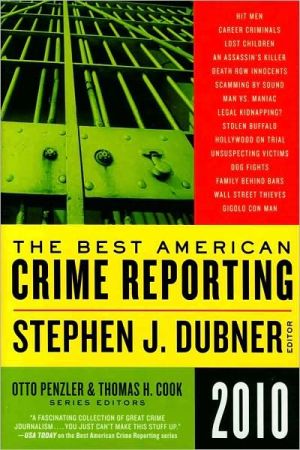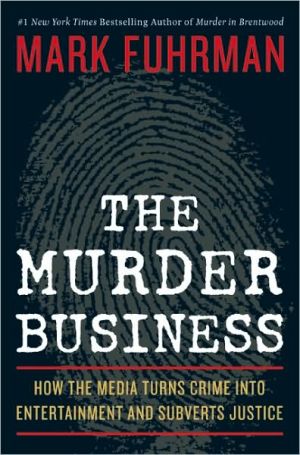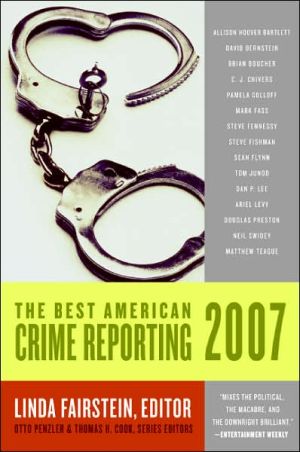Spinning the Law: Trying Cases in the Court of Public Opinion
High-profile courtroom dramas fascinate our nation, especially when they concern the rich and famous. And while the American public has come to realize that the spin factor is a prime ingredient in political tactics and marketing campaigns, many are unaware of the strategies for shaping public opinion when it comes to major courtroom battles. This behind-the-scenes analysis of media strategies presents an intriguing, often entertaining curriculum that they do not teach in law school or...
Search in google:
High-profile courtroom dramas fascinate our nation, especially when they concern the rich and famous. And while the American public has come to realize that the spin factor is a prime ingredient in political tactics and marketing campaigns, many are unaware of the strategies for shaping public opinion when it comes to major courtroom battles. This behind-the-scenes analysis of media strategies presents an intriguing, often entertaining curriculum that they do not teach in law school or journalism classes. As the lead counsel in some of the country s most notable cases and a savvy legal commentator with hundreds of television appearances, author Kendall Coffey brings a distinctive combination of depth as a legal practitioner and experience as a media analyst to this insightful book. He begins with an historic election fraud trial, relying on his personal experience with the basics of law spin. He then guides the reader through an abbreviated, engrossing tour of spinning cases through the ages including Socrates and Joan of Arc, as well as the Charles Lindbergh kidnapping case. Modern cases include the O. J. Simpson trial, the author s own experiences in the international Elian Gonzalez controversy and his thoughts on the possible overwhelming effect that that controversy had on Florida in the 2000 presidential election between Gore and Bush. Coffey also examines the most famous cases of recent times those of Michael Jackson, Kobe Bryant, Martha Stewart, Scott Peterson, Gordon Scooter Libby, and the shenanigans of impeached former Governor Rod Blagojevich. Along the way, the author exposes many of the myths associated with the law, debunking assumptions about legal concepts ranging from circumstantial evidence and cooperating witnesses to so-called prosecutors vendettas. Coffey s many entertaining examples and explanations make this book ideal reading for everyone fascinated by celebrity legal problems as well as for lawyers, public relations professionals, journalists, and media students. Publishers Weekly Coffey is a former U.S. attorney who now plies the airwaves (he has appeared on the Today show, Larry King Live, among others), offering commentary on high-profile and sensational legal cases. As U.S. attorney in Florida, he was involved in such cases himself: the Elian Gonzalez case and the 2000 presidential recount. Now he calls on his experience to deconstruct the art and theory of media manipulation in this candid, and cynical, look at how lawyers use the media to shape public perceptions of their clients including Martha Stewart, Scott Peterson, Michael Jackson, and O.J. Simpson. His modus operandi is to give a short example of a media ploy, such as the decision to put Kobe Bryant's alleged victim's sexual history in play, and to follow the example with a pithy "Spinning Lesson" such as "Questions with shock value have news value." Coffey is knowledgeable about the nuances of spin, but his flippant style, although often entertaining, can be out of sync with the sordid cases and the often offensive and borderline ethical behavior of the spinners. Coffey ends with a sentence championing the virtues of the Constitution. It might just be spin. (Sept.)
SPINNING THE LAW\ TRYING CASES IN THE COURT OF PUBLIC OPINION \ \ By KENDALL COFFEY \ Prometheus Books\ Copyright © 2010 Kendall Coffey\ All right reserved.\ ISBN: 978-1-61614-210-0 \ \ \ Chapter One\ DEAD MAN VOTING AND THE ABC'S OF LAW SPIN \ Election defeats are never an enhancer of friendships. In Miami, where no one has lineage or history, the obliteration that comes with losing is stunning and complete. Yet, while losing imposes an instant blackout on public support, even upon friendships, almost all perceptions have fleeting lives. And so I urged my friend, the just-defeated mayor, to remain mindful that Miami always offers fertile ground for comebacks, mapping for him several pathways that could return him to city hall in a few years. His wounded eyes and slow words, however, said that he was finished.\ The runoff defeat of Joe Carollo, the incumbent mayor who led the field of candidates after the first election, astonished the Anglos in the community. After all, he earned solid marks for his work in heading the city's efforts to overcome a shattering financial crisis that he inherited from past administrations. The Miami Herald supported him, as did the downtown business establishments and many community leaders.\ Moreover, in the nine days between the first round of balloting on November 4, 1997, and the election runoff on November 13, a torrent of voter fraud allegations detonated across Miami's political landscape and in the media. One allegation concerned a veritable cottage industry of absentee-ballot brokers. During the runoff campaign, workers for the mayor's principal opponent, Xavier Suarez, were arrested for election crimes. In view of Carollo's accomplishments, his support, and his first-place finish in the first round of voting, the barrage of evidence concerning election fraud by those accepted in the opposing camp would surely have guaranteed a landslide margin in any major metropolitan area. In any city, that is, except Miami.\ THE RADIO REVOLT\ The day before that grim election night, I received a call from Joe's wife, Mari Carollo, who was privately sensing defeat. Like her husband, Mari was a Cuban American who knew more about Miami than the English-language television stations and newspapers. Mari listened to local Spanish-language radio and was deeply concerned about what she heard in the final days before the runoff. Cuban American radio commentators and their call-in listeners were reacting angrily to the charges of voter fraud. Instead of blaming Carollo's enemies, they were castigating Carollo for presenting the charges through venues such as the civil lawsuit that I had filed.\ Radio listeners were sympathetic to the people who were arrested, one of whom was in his nineties. Hauling an aging vote broker off to jail amid the glare of television cameras would not be a pleasant picture anywhere. But in this town, the backlash was devastating. The elderly, the very young, and those who fight Castro are cherished in Hispanic Miami. The arrest of an elderly campaign worker was not seen as an attempt to stop vote stealing but rather as an outrageous mistreatment of an anciano that was supposedly orchestrated by Carollo and his Anglo police department. Outraged, radio barrages dominated the airwaves with accusations that Carollo was maligning Cuban Americans and collaborating with the liberal Miami Herald, a longtime target of Spanish-language talk show hosts and their listeners.\ While Mari Carollo feared these radio talk shows, few Anglos in the city had any idea of their influence. While English-language talk shows in the region concentrate on sports and reserve their anger for struggling quarterbacks and poor free-throw shooting, the Spanish-language stations focus almost exclusively on politics. The impact can be dramatic. After a new topic greets the morning's listeners, the message resonates wildly throughout the community by early afternoon. And because listeners who call in usually speak anonymously, they feel free to make extreme allegations that range from aligning local political figures with mistresses (bad), with the Miami Herald (really bad), or even with Fidel Castro (time to leave town). Local gossip travels fast in any city, depending on its sensationalism, but even when accelerated by e-mail and chat rooms, it cannot strike the public with Delta Force unless it is validated by mainstream news reporting. In Miami, once embraced by the radio shows, raw accusations move at warp speed to elderly listeners who thereupon spread gossip to the younger generations of their close-knit families—adult children, grandchildren, nieces, and nephews. With radio stations blasting Carollo for instigating prosecutions against Hispanics, all as part of a Miami Herald conspiracy, Carollo's lead from nine days earlier suddenly evaporated. It was a defeat that startled only the many who did not understand a chronically polarized community in which everyone is part of some minority.\ The mayor's wife knew what we did not know. While we understood the importance of the court of public opinion, we failed to recognize that there can be more than one such court in session at the same time—including one in which legal action against voter fraud can backfire badly. I should have known better. Miami is not a melting pot. It is a stir-fry of languages and people spiced with their own unique histories. The pieces often sizzle, but many do not blend. Some ask whether it is a Spanish-speaking community where English is spoken, or a US city going through its foreign-language phase. Meanwhile, there are billboards beckoning in Portuguese, while radio announcements are heard in Creole. The premise that Miami lacks tradition because its people all come from somewhere else ignores its most obvious tradition—a legacy of newcomers that is continually replenished.\ One of the few constants is the Miami Herald. Although proud of its distinguished history and many Pulitzer Prizes, the newspaper, like many Anglo institutions, has struggled to find its place among the fast-moving pieces that continually revise Miami's political and cultural landscape. The paper was a staunch supporter of Mayor Carollo during his efforts to salvage the city from financial crisis. Supporting Carollo, who was dubbed "Crazy Joe" by the unkind, was not always easy. While he was respected for his honesty, he was a polarizing political figure. For many, his uncompromising positions, while based on high standards of personal integrity, were better suited for a police chief than for a big-city mayor surrounded by more flexible politicians.\ Personally and politically conservative, Carollo had a relentless style that made him the right leader to turn around the financial crisis he inherited when he arrived at city hall the previous year. New York bankers holding the city's bonds found him credible, a welcome change from the politics-as-usual that had brought Miami to near insolvency.\ After the mayor helped stabilize the city, though, he collided increasingly with business interests that were used to a more compliant city hall. For the Miami Herald, Carollo's attempts to honor its anticorruption traditions as well as to build support in the Cuban American community made him a very acceptable leader. That reform-minded leader, though, lost his city-paid driver and left his lawyer with a quixotic legal challenge.\ CHALLENGING THE ELECTION\ On November 4, following wild swings in the opinion polls, Carollo received 49.6 percent of the voters, Suarez received 46.8 percent, and a handful of votes went to minor candidates. Although barely missing the majority needed to win outright in the first round, Carollo won by a decisive margin, 51 to 45 percent in the precinct polling places of Miami. With absentee ballots, on the other hand, Suarez achieved a striking advantage of 61 to 35 percent.\ Potential explanations for the troubling discrepancy abounded. In those years, absentee voters were citizens who could not go to the polls on Election Day due to out-of-town travel, physical disability, or insurmountable work obligations. Through requests to the elections department, such voters secured by mail or by personal delivery ballots that they completed at home and returned in time for the election.\ Since absentee ballots were not completed in the private sanctity of a voting booth, Florida courts considered them to be susceptible to third-party manipulation, even fraud, calling them a "fruitful means of corrupting the ballot if not carefully safeguarded." In extreme instances, absentee ballots could be intercepted from the mail and fraudulently completed by vote thieves. Unless a trained handwriting expert reviewed the voter's signature appearing on the outside of the ballot envelope and compared it with the signature on file at the elections department, fraud was virtually undetectable. No supervisor of elections has the resources to employ handwriting experts to review the thousands, sometimes tens of thousands, of absentee ballots that have to be counted within the brief period before and during the day of the election. Since signature comparison, invariably a quick glance from untrained eyes, constituted the only official means for verification, the process was notoriously unreliable. With little protection against forgeries, rumors long circulated in Miami about brokers collecting absentee ballots and delivering them to campaigns. For operatives with access to the elderly, the absentee ballots of shut-ins and even nursing-home patients could be collected in bundles and delivered to the broker's candidate. At times, some collectors might "assist" the voter in completing the ballot, actually punching through the candidate's number in the days of punch-card ballots—ballot brokers did not leave hanging chads, as I kept hearing from local politicos. Some agents received a fixed price per ballot (ten dollars each was commonly quoted) while others wanted the present and future gratitude of the soon-to-be officeholder. Such bundles could deliver what no amount of television advertising could guarantee—a fistful of votes that were already "in the can," as the Miami-Dade Democratic Chair Joe Geller would explain.\ Street talk was alive with reports of unusually aggressive absentee-ballot collecting by Carollo's adversaries. Although his opponent was Suarez, Joe Carollo's nemesis was Miami City Commissioner Humberto Hernandez, who was purportedly politically armed and dangerous with a massive absentee-ballot operation. An avowed enemy of Carollo, Hernandez would be considered a nonfactor in most communities due to a distinction recently awarded by a federal grand jury: he was an indicted defendant awaiting trial for millions of dollars in mortgage fraud. In Miami's unique political environment, Hernandez swept to reelection on the Miami Commission, the city's governing body, by portraying himself as a victim of an anti-Hispanic establishment. Along the way, he amassed an army of hundreds of followers, some of whom may have made careers out of collecting questionable absentee ballots. As we calculated Hernandez's ballot machinery into the curious disparity between absentee ballots and polling-place votes, our suspicion turned to investigation.\ The following morning, we reviewed the thousands of absentee envelopes that accounted for Carollo's failure to win an outright majority on November 4.\ In Florida, as in other states, the election workers separate the ballot envelope signed by the voter from the unidentifiable ballot itself so that the voter's name cannot be matched to the selections made on the punch-card ballot. While visual inspection of ballot envelopes could not identify the candidate selected by that voter, the absentee ballot envelope still contained two critical pieces of information: the signature of the voter and the signatures of his or her witnesses. Fortunately for our investigation, ballot brokers almost always signed the ballot envelope as witnesses for the absentee voters they enlisted. As a result, by totaling the number of times the same name kept appearing as a witness, we quickly identified the leading vote collectors as well as the votes they collected.\ One of the largest collections belonged to Alberto Russi. As we analyzed the Russi votes, discrepancies materialized. Suspiciously similar voter signatures appeared from supposedly different voters. And very large families were registered as living in small dwellings, some of which were unoccupied. Meanwhile, anecdotal reports about apparent fraud continued to flood our offices. As we moved quickly toward filing a lawsuit challenging the absentee balloting, we remained optimistic that with or without it, Joe would likely win the runoff. And by taking public action against the voter fraud being perpetrated by his adversaries, an anticorruption lawsuit would assuredly resonate positively among the voters.\ With the runoff election just days away, velocity was as crucial as accuracy. By late Friday night, I had prepared a lawsuit and made arrangements with theMiami-Dade Circuit Court to file it on Saturday morning as an emergency action.\ THE LAWSUIT PRESS RELEASE\ In some ways, drafting a lawsuit is much easier than lawyers want the public to believe. We might encourage the world—and especially well-paying clients—to believe that only attorneys know the incantations required for legal papers, as we stand behind the wizard's curtain with a vast repertoire of legalese. Most lawsuits are actually simple creatures. They include summaries of the key facts, usually in chronological order, followed by a few sections that use boilerplate language to establish each legal claim or count. For example, a three-count lawsuit (like a three-count criminal indictment) is essentially a written chronology of a controversy's basic facts, followed by three different itemizations of the elements for the three legal theories.\ The rules for preparing lawsuits in state as well as federal courts require a "short and plain" statement of the claims. Underscoring this entreaty for simplicity, the courts have created forms for lawsuits as models for lawyers to follow, forms that are remarkably bland and brief. In the court of public opinion, though, there is nothing short and plain about the way high-profile lawsuits are presented. Many such court papers bear a striking resemblance to press releases. And, in political cases, comparisons can be made to a Fourth of July stump speech.\ While there was much about election challenges that I was learning for the first time, I was already experienced in drafting lawsuits reviewed by reporters. A decade earlier, a developer client with a giant project in the Florida Keys was abruptly cut off from tens of millions of dollars in funding by his lender, Continental Illinois National Bank. After the lender dropped its bombshell on a Friday, we worked through the weekend to prepare not only a lawsuit focused on financial recovery for the massive damages but also a message aimed at the business community.\ When I read the news reports the day after the lawsuit was filed, I was struck by how extensively the reporters had relied on verbatim quotes lifted directly from the pleadings. Fortunately, we had included plenty of hard-hitting phrases laced with adjectives not found in most legal dictionaries. That lawsuit was eventually transferred to a different state, and while I did not participate in the $110-million verdict that went to the plaintiff years later, I received a crash course on the media and court papers.\ That coursework taught me why reporters like to quote court papers. With a word-for-word account of the litigant's own claims, journalists cannot be accused of misquotes or distortions. More significant, papers filed in court are immunized from defamation suits, no matter how extreme the allegations may be. At times, this immunity from defamation can become a license for lawyers to take extreme liberties with the truth. In recent years, the media's immunity has created an opportunity for press-savvy lawyers to draft papers that are designed to be quotable.\ Good reporters exercise caution before repeating obvious nonsense, but trash-talking lawyers can sometimes exploit reporters to publicize vilification that would otherwise allow the victim to counter with massive claims for defamation. While courts can enter orders striking out outrageous allegations, such rulings would occur, if at all, in a court hearing well after the fact.\ (Continues...)\ \ \ \ \ Excerpted from SPINNING THE LAW by KENDALL COFFEY Copyright © 2010 by Kendall Coffey . Excerpted by permission of Prometheus Books. All rights reserved. No part of this excerpt may be reproduced or reprinted without permission in writing from the publisher.\ Excerpts are provided by Dial-A-Book Inc. solely for the personal use of visitors to this web site. \ \
Contents\ Foreword by Alan M. Dershowitz....................7\ Introduction....................9\ Chapter 1: Dead Man Voting and the ABC's of Law Spin....................15\ Chapter 2: Spinning Cases Through the Ages....................35\ Chapter 3: The O. J. Revolution....................61\ Chapter 4: Elian Gonzalez—The Battle for the Child and for Public Opinion....................85\ Chapter 6: Open Trials—Press Freedom or Press Free-for-All?....................139\ Chapter 7: Defense Lawyers—The Underdogs and Their Uphill Strategies....................161\ Chapter 8: The Case Studies—A "Human Monster," a Domestic Diva, the King of the Court, the King of Pop, and Governor Blabbermouth....................179\ Chapter 9: Prosecutors and the Press....................241\ Chapter 10: Pop Law—Legal Myths and the Media....................261\ Chapter 11: A Media Primer for Spinners....................291\ Afterword....................323\ Notes....................327\ Index....................375
\ Publishers WeeklyCoffey is a former U.S. attorney who now plies the airwaves (he has appeared on the Today show, Larry King Live, among others), offering commentary on high-profile and sensational legal cases. As U.S. attorney in Florida, he was involved in such cases himself: the Elian Gonzalez case and the 2000 presidential recount. Now he calls on his experience to deconstruct the art and theory of media manipulation in this candid, and cynical, look at how lawyers use the media to shape public perceptions of their clients including Martha Stewart, Scott Peterson, Michael Jackson, and O.J. Simpson. His modus operandi is to give a short example of a media ploy, such as the decision to put Kobe Bryant's alleged victim's sexual history in play, and to follow the example with a pithy "Spinning Lesson" such as "Questions with shock value have news value." Coffey is knowledgeable about the nuances of spin, but his flippant style, although often entertaining, can be out of sync with the sordid cases and the often offensive and borderline ethical behavior of the spinners. Coffey ends with a sentence championing the virtues of the Constitution. It might just be spin. (Sept.)\ \
